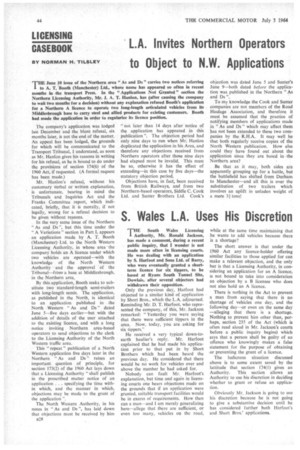S. Wales L.A. Uses His Discretion
Page 46

If you've noticed an error in this article please click here to report it so we can fix it.
THE South Wales Licensing Authority, Mr. Ronald Jackson, has made a comment, during a recent public inquiry, that I wonder is not made more often in licensing courts. He was dealing with an application by S. Harfoot and Sons Ltd. of Barry, who were eventually granted a shortterm licence for six tippers, to be based at Ryans South Tunnel Site, Dowlais, after several objectors had withdrawn their opposition.
Only the previous day, Harfoot had objected to a similar kind of application by Short Bros., which the L.A. adjourned. Reminding Mr. D. T. Harfoot, who represented the company, of this, Mr. Jackson remarked: "Yesterday you were saying that there were sufficient tippers in the area. Now, today, you are asking for six tippers."
He received a very typical down-toearth haulier's reply. Mr. Haricot explained that he had made his application prior to that put in by Short Brothers which had been heard the previous day. He considered that there would be no work for vehicles over and above the number he had asked for.
Nobody can fault Mr. Harfoot's explanation, but time and again in licensing courts orie hears objections made on the grounds that if an application were granted, suitable transport facilities would be in excess of requirements. How then can a man—and I am merely generalizing here—allege that there are sufficient, or even too many, vehicles on the road, while at the same time maintaining that he wants to add vehicles because there is a shortage?
The short answer is that under the 1960 Act any licence-holder offering similar facilities to those applied for can make a relevant objection, and the only bar is that a Licensing Authority, in considering an application for an A licence, is not bound to take into consideration an objection by a B licensee who does not also hold an A licence.
There is nothing in the Act to prevent a man from saying that there is no shortage of vehicles one day, and the following day—or even on the same day —alleging that there is a shortage. Nothing to prevent him other than, perhaps, section 235 of the Act (which is often read aloud in Mr. Jackson's courts before a public inquiry begins) which says that a person shall be guilty of an offence who knowingly makes a false statement for the purpose of obtaining or preventing the grant of a licence.
The ludicrous situation discussed above is to some extent saved by the lattitude that section 174(1) gives an Authority. This section allows an Authority to use his discretion in deciding whether to grant or refuse an application.
Obviously Mr. Jackson is going to use his discretion because he is not going to give a substantive decision until he has considered further both Harfoot's and Short Bros.' applications.












































































































































